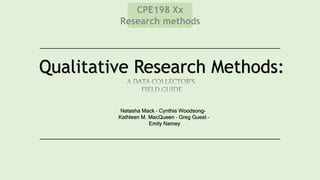
Qualitative Research Method.pptx
- 1. Qualitative Research Methods: Natasha Mack – Cynthia Woodsong- Kathleen M. MacQueen – Greg Guest – Emily Namey
- 3. This module introduces the fundamental elements of a qualitative Approach to research, to help you understand and become proficient in the qualitative Methods discussed in subsequent modules. This module covers the following topics: • Introduction to Qualitative Research • Comparing Qualitative and Quantitative Research • Sampling in Qualitative Research • Recruitment in Qualitative Research • Ethical guidelines in Qualitative Research
- 4. hat is Qualitative Research? o Scientific Research • Seeksanswerstoaquestion • Systematicallyusesapredefinedsetof procedurestoanswerthequestion. • Collectsevidence • Producesfindingsthatwerenotdetermined Inadvance • Producesfindingsthatareapplicablebeyond Theimmediateboundariesofthestudy. Effective inobtainingculturally Specificinformationaboutvalues, Opinions,behaviors, andsocial Contexts of particularpopulations Seeks tounderstandto givenresearch Researchproblem ortopicfromthe perspectives Of thelocal populationitinvolves.
- 5. Whatcanwe learnfrom QualitativeResearch? - Complex textual descriptions - “human” side of an issue - Effective in identifying intangible factors - Can help us interpret and better understand the complex reality of a given Whataresome qualitative Researchmethods? • Participant Observation • In-depth Interviews • Focus Groups Whatformsdoqualitativedata take? • Field notes • Audio recordings • transcripts
- 6. What are the basic Differences between Qualitative And Quantitative • Analytic objectives • Types of questions they • Types of dat instruments they use • Forms of data they prod • Degree of flexibility built into study design
- 8. Whatisthemostimportantdifferencebetween quantitativeandqualitativemethods? Thekeydifference between quantitativeandqualitativemethods istheirflexibility QUALITATIVE QUANTITATIVE Flexible fairlyinflexible “open-ended” “closed-ended” orfixed participantsarefreetorespondin theirownwords,andtheseresponses tendtobemorecomplexthansimply “yes”or“no.” Theadvantageof thisinflexibilityis thatitallowsformeaningful comparisonofresponsesacross participantsandstudysites. Lessformal formal
- 9. What are the advantages of qualitative methods for exploratory research? One advantage of qualitative methods in exploratory research is that use of open- endedquestions. Open-ended questions have the ability to evokeresponsesthatare: • meaningful and culturally salient to the participant •unanticipatedbytheresearcher •richandexplanatoryinnature Another advantage of qualitative methods is that they allow the researcher the flexibility to probe initial participant responses – that is, to askwhyorhow. Is my quantitative experience applicable to qualitative research? Experience in quantitative methods is not required, but neither is it a disadvantage. Essential for our purposes, rather, is that all qualitative data collectors have a clear understanding of the differences between qualitative and quantitative research, in order to avoid confusing qualitative and quantitative techniques.
- 10. What is purposive sampling? What is quota sampling? What is snowball sampling? Purposive sampling, one of the most common sampling strategies, groups participants according to preselected criteria relevant to a particular research question (for example, HIV-positive women in Capital City) Quota sampling, sometimes considered a type of purposive sampling, is also common. In quota sampling, we decide while designing the study how many people with which characteristics to include as participants. Characteristics might include age, place of residence, gender, class, profession, marital status, use of a particular contraceptive method, HIV status, etc A third type of sampling, snowballing – also known as chain referral sampling – is considered a type of purposive sampling. In this method, participants or informants with whom contact has already been made use their social networks to refer the researcher to other people who could potentially
- 11. How are recruitment strategies decided? Recruitment strategies are determined by the type and number of data collection activities in the study and by the characteristics of the study population. What if we disagree with recommendations from local leaders’? It is important for the research team to be respectful of and responsive to the guidance and advice of local experts and community leaders. Remember that they have had more opportunity to establish rapport with the local community and they will also have to maintain that rapport after the study is complete. Remember also that community members may hold community leaders and local organizations accountable for any misunderstandings or other problems resulting from the behavior of the field staff What should we say to people when we try to recruit them? Each research team develops guidelines for the introductory comments staff make to potential participants at each site. These guidelines need to be sensitive to the social and cultural contexts from which participants will be recruited.
- 12. Can we recruit people who are legally under the care of a parent or guardian? Yes, you may recruit minors, but in most cases you must obtain informed consent from the parent or guardian, as well as from the potential participant. Exceptions to the parental consent requirement include pregnant adolescents and homeless minors, but you should always consult the guidelines of the relevant ethics review boards before proceeding with recruitment. Do we always need to obtain informed consent? If so, oral or written? What if the recruitment strategy is not working? The ethics committee that reviews and approves the study protocol determines whether informed consent needs to be obtained for each data collection activity. Typically, formal informed consent is necessary for all qualitative research methods except participant observation, regardless of the sampling method used to identify potential participants and the strategies used to recruit them. it may be necessary to develop a new recruitment strategy because following the original plan has resulted in inadequate enrollment or because researchers determine that they need participants who meet a different set of criteria. After meeting to discuss alternatives, the research team should
- 13. Research ethics deals primarily with the interaction between researchers and the people they study. What are the fundamental research ethics principles? o Respect for persons o Beneficence o Justice o respect for communities How do we protect confidentiality? Because qualitative research is conversational, it is important for data collectors to maintain clear boundaries between what they are told by participants and what they tell to participants. Conversation is a social act that requires give and take. As qualitative researchers we “take” a lot of information from participants and therefore can feel a strong need to “give” similar information in return